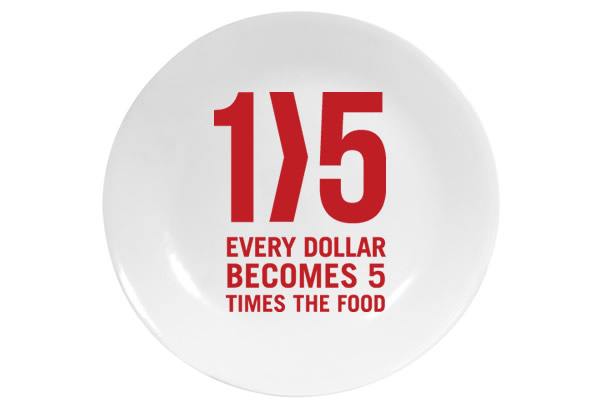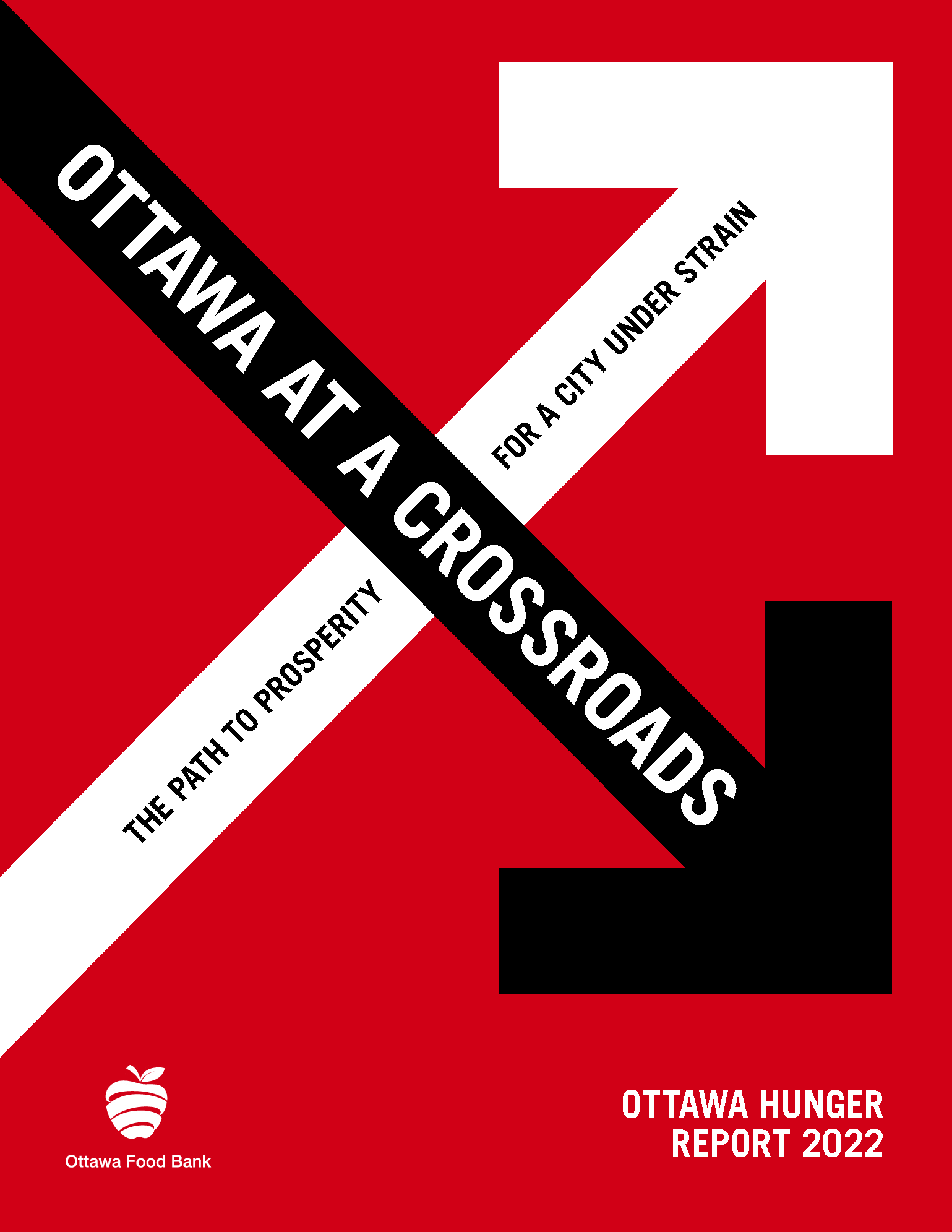As part of our commitment to our donors, we have created this page to clearly outline our activities, community impact and outcomes. We also have included our financials to ensure we are transparent with donor dollars.
The Ottawa Food Bank was formed in 1984 when several small community food banks decided to work together and pool resources to help the most vulnerable in our community. Our organization has grown significantly since that time and now functions as the City’s only central food collection, warehouse, and distribution centre, providing 12 - 14 tons of food daily to a large network of front-line member agencies.
What we do
The Ottawa Food Bank’s role is to collect, purchase, grow, and distribute food to partner agencies who, in turn, provide food and support to clients each month.
A client can visit their food bank once a month and we help to provide approximately a weeks’ worth of food and groceries. We also provide baby items, such as diapers, formula and baby food to new parents.

Every dollar goes further
In addition to securing millions of dollars worth of donated food, we purchase about $6.3 million of food every year to meet the need.
Because we buy food in such large quantities and have amazing food industry partners, we can make every donation go further. This means every dollar donated is approximately $5 worth of food delivered to the community.
Our Hunger Count In Recent Years
| Number of Client Visits | Year | Difference over previous year | Percentage difference over previous year |
|---|---|---|---|
| 277,857 | 2020 | ||
| 313,298 | 2021 | +35,441 | 12.75% increase |
| 403,467 | 2022 | +90,169 | 28.8% increase |
Methodology: The Hunger Count survey is sent out to food banks in February of each year by the provincial association, Feed Ontario. The data collected is generally demographic information, such as age, sex, household make up. It also includes some optional psychographic questions such as source of income, education, and housing type.
The Hunger Count tracks data in March, every year, so that we can identify trends and issues in food banking in Ottawa. March is chosen as it is an unexceptional month, without predictable high or low use.
Data is collected from our agencies using a database called Link2Feed. Data collected through Link2Feed is non-identifiable and the Ottawa Food Bank is not privy to clients’ individual private information.
Food Outputs (pounds)
| 2018-2019 | 2019-2020 | 2020-2021 | 2021-2022 |
|---|---|---|---|
| 5,001,317 | 5,434,675 | 7,134,875 | 10,274,328 |
(including the two main shelters)
Food Distribution Numbers by Category (lbs.)
The Ottawa Food Bank has a commitment to fresh and nutritious food. Here is the following food distribution by pounds:
FRESH FOOD 4,200,200 lbs. (41%)
Fresh Fruit & Vegetables 1,922,500 lbs.
Fresh Meat & Poultry 665,500 lbs.
Dairy & Eggs 1,181,300 lbs.
Bread & Miscellaneous Perishable 430,900 lbs.
Canned Goods 2,504,025 lbs. (24%)
Total = 10,274,328 lbs.
BABY FOOD 123,663 lbs. (1%)
OTHER 1,697,350 lbs. (34%)
*including grains, cereal, snacks, and other food items
Volunteer Support
Volunteer Hours
- Hamper Delivery 1,327 (7.5%)
- Delivery Assistants 1,436 (8%)
- Food Sorting 8,532 (49%)
- Events 291 (2%)
- Community Harvest 5,449 (31%)
- Board of Directors 350 (2%)
- Admin Support 110 (.5%)
Total Volunteer Hours = 17,486
Volunteer Information:
During the pandemic, we had to eliminate some volunteer roles and reduce volunteer opportunities by over 50%. Even though there was a significant decrease in opportunities, there was only a 14% decrease in the number of volunteer hours donated to the Ottawa Food Bank! This truly illustrates the dedication of our volunteers – fewer people gave more of their time to meet the needs of the community.
- 2,000 volunteers donated a total of 17,486 hours of their time this past fiscal year
- Due to proximity, Admin Support roles were put on hold during the pandemic. Now those roles have slowly started to return.
Click below to learn more about becoming a volunteer.
Financial Information
Fund contribution sources for 2021-2022 (chart). Click here to review our complete Audited Financial Statements.
Revenue
- Individual Donations $13,769,058 (51%)
- Grants & Corporate Sponsorship $1,866,163 (7%)
- Other Income $235,574 (1%)
- Community Engagement Events $1,524,082 (6%)
- Government Grants $392,032 (1%)
- Value of Food Donated & Distributed $9,424,131 (34%)
Total Revenue = $27,211,040
Expenses
-
Charitable Programs (86%):
Food Purchases $6,314,782
Food Donations Distributed $9,424,131
Programs & Operations $4,802,801
-
Food Raising, Fundraising & Promotions $2,275,301 (9%)
- General Administration $1,293,812 (5%)
Total Expenses = $24,110,827
Click below to view our Audited financial statements.
2021 - 2022 Activities and Impacts
KickStart After 4
No school supply is as critical as a healthy snack or meal. The KickStart After 4 Program provides and delivers thousands of healthy nutritious snacks per month to children at after-school programs in Ottawa. KickStart ensures that children from food insecure families receive healthy snacks that provide the energy to thrive in physical and mental activities every day.
Just a little bit of good food can do so much. Over the last two years, the Ottawa Food Bank has worked with our dietician to identify snack items that could have the biggest nutritional impact for children. We made a significant investment in the quality of food we provide through this important program.
Outputs
Number of Participating Agencies:
Outcomes
Children have access to a healthy snack each school day. Our snacks provide a serving from each food group. This important end of day snack ensures children have nutrient-dense food to help them with homework and being active. Many of the after-school programs also provide a homework club or cooking class.
The Summer Nutrition Program
The Summer Nutrition Program is one of our most important programs for children. When school is done in June, so are the school meal programs. Many of the children who receive a meal through a school breakfast or lunch program are left with no resources over the summer. Without this program, many children would be going without regular meals. Also included as part of the Summer Nutrition Program were fun, bilingual, nutritional literary resources from the Ottawa Food Bank’s Dietitian, including knowledge and skill-building activities.
Outputs
impacted weekly
Number of Participating Agencies:
Outcomes
Children in low-income communities have access to a nutritious meal every day during the 8-week program. This alleviates the burden on families, already struggling to make ends meet.
Baby Basics Program
“Nutrition and access to healthy food from a young age play a crucial role in a child’s physical, intellectual and emotional development. For kids to reach their full potential, we need all families in our region to have access to healthy food, nutrition information and support to provide a balanced diet for their children.” – Dr. Lindy Samson, Chief of Staff and Chief Medical Officer at the Children’s Hospital of Eastern Ontario (CHEO)
With 5% of food bank clients being babies under the age of two, our Baby Basics Program is important to struggling parents across the city. Baby supplies continue to be some of the most expensive products to purchase and least donated item.
Outputs
(includes formula, food, and cereals)
Outcomes
This program ensures the nutritional needs of at-risk infants are met. This also reduces stress on families, as parents often will sacrifice eating for themselves to make sure their children can eat. Providing baby essentials removes the difficult decisions for parents, like choosing between food and paying the heating bills.
Community Harvest Farm
In 2010 the Ottawa Food Bank started an 8-acre community farm program, Community Harvest. The land is donated to us by a local family and hundreds of volunteers help plant and harvest the crop each year.
We grow 23 different varieties of fruits and vegetables, including broccoli, squash, tomatoes, potatoes, carrots, garlic, and watermelons. Most of our produce goes from farm to table in less than five days.
Outputs
to the community from our farm
Outcomes
Free vegetables and fruits available to families for who could not otherwise afford fresh produce. Ensure families receive important vitamins and nutrients.
Global Marketplace Program
Started as a pilot project in 2019-2020, the Global Marketplace Program is in response to the member agency food bank network identifying the need for accessibility to and distribution of ethnocultural foods for food insecure households.
Participating programs are provided with funding by the Ottawa Food Bank to help purchase the culturally appropriate foods requested by their community.
The longer-term goal of the program is for the Ottawa Food Bank to be able to include the most requested items in our own purchasing to provide to member agencies across the city. Most requested items include Halal meats (goat, lamb, chicken), oils, plantains, ginger, yams, pita bread, and dates to name a few.
Outputs
member agencies
Outcomes
Each community had the opportunity to identify culturally appropriate foods that they wanted to see represented in their local food bank. This program resulted in increased crop diversity at our Community Harvest Farm and new procurement considerations for the Ottawa Food Bank.
